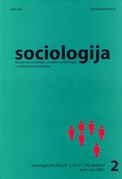Socioprostorni identitet Beograda u kontekstu urbanog i regionalnog razvoja Srbije
Sociospacial Identity of Belgrade in the Context of Urban and Regional Development of Serbia
Author(s): Sreten VujovićSubject(s): Social Sciences
Published by: Sociološko naučno društvo Srbije
Keywords: Urban identity; city network; regional development; Belgradization
Summary/Abstract: Based on the analyses of sociologists, historians, economists, demographers, anthropologists, and based on author’s own research, the aim of the paper is to point to the complex and dynamic sociospatial identity of contemporary Belgrade in the context of urban and regional development of post-socialist Serbia. The analytical framework includes, first of all, the definition of the city’s identity in terms of self-awareness of a city as sociospatial collectivity, which historically originates and develops in dependency which the city and the individuals in it establish in relationships with other cities. It then cites the various concepts by means of which identity of the modern city is constructed: the entrepreneurial city (Harvey), the creative city (Florida and Landry), the exciting city (Richards and Palmer), the city as a text (Radović), a competitive identity of the city (Anholt) and so on. In particular, Belgradization as a process of concentration of money and power in the capital is analyzed and it is concluded that the network of Serbian cities is pyramidal, that the regionalization of Serbia is asymmetric, and that Belgrade is a primate city, too big and too powerful for Serbia i.e. that Belgradization increases regional imbalance in Serbia. The paper concludes with an optimistic assessment that Belgrade, despite numerous problems in its development, has the potential to become the „European Capital of Culture” in 2020.
Journal: Sociologija
- Issue Year: 56/2014
- Issue No: 2
- Page Range: 145-166
- Page Count: 22
- Language: Serbian

